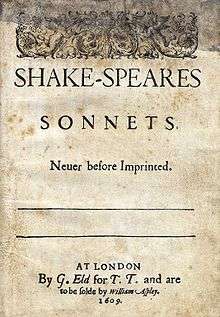Sonnet 74
Sonnet 74 is one of 154 sonnets published by the English playwright and poet William Shakespeare in 1609. It is one of the Fair Youth sequence.
| Sonnet 74 | |||||||
|---|---|---|---|---|---|---|---|
 The first eleven lines of Sonnet 74 in the 1609 Quarto | |||||||
| |||||||
Synopsis
This sonnet takes back the urging that occurs in Sonnet 71, that the young man should forget the author. Instead, this sonnet encourages the youth to keep the better part of the poet, which is in his verse, and which will outlive the poet. There is a sense in this poem that the young man is like one who will potentially inherit something of value, and is at the bedside of a dying rich relation, and is considering in a legalistic manner what that value will be – once the dead body has been carried away and dumped in the earth as food for worms. The young man will inherit the best part of the poet – his spirit in the form of this sonnet.[2]
Structure
Sonnet 74 is an English or Shakespearean sonnet, which contains three quatrains, followed by a final rhyming couplet. It follows the rhyme scheme ABAB CDCD EFEF GG, and is composed in iambic pentameter, a poetic metre in which each line has five feet, and each foot is a pair of weak/strong syllables. The tenth line exemplifies a regular iambic pentameter line:
× / × / × / × / × / The prey of worms, my body being dead; (74.10)
- / = ictus, a metrically strong syllabic position. × = nonictus.
The meter demands a few variant pronunciations: line 4's "memorial" counts as 3 syllables,[3] line 8's "spirit" counts as 1 (possibly pronounced as spear't, sprite, sprit, or spurt),[4] and line 12's "rememberèd" is expanded to 4.[5]
Notes
- Shakespeare, William. Duncan-Jones, Katherine. Shakespeare’s Sonnets. Bloomsbury Arden 2010. p. 259 ISBN 9781408017975.
- Shakespeare, William. Ingram, William. Redpath, Theodore. Shakespeare’s Sonnets. Barnes & Noble. 1965.
- Kerrigan 1995, p. 267.
- Booth 2000, p. 262.
- Kerrigan 1995, p. 113.
References
- First edition and facsimile
- Shakespeare, William (1609). Shake-speares Sonnets: Never Before Imprinted. London: Thomas Thorpe.CS1 maint: ref=harv (link)
- Lee, Sidney, ed. (1905). Shakespeares Sonnets: Being a reproduction in facsimile of the first edition. Oxford: Clarendon Press. OCLC 458829162.
- Variorum editions
- Alden, Raymond Macdonald, ed. (1916). The Sonnets of Shakespeare. Boston: Houghton Mifflin Company. OCLC 234756.
- Rollins, Hyder Edward, ed. (1944). A New Variorum Edition of Shakespeare: The Sonnets [2 Volumes]. Philadelphia: J. B. Lippincott & Co. OCLC 6028485.
- Modern critical editions
- Atkins, Carl D., ed. (2007). Shakespeare's Sonnets: With Three Hundred Years of Commentary. Madison: Fairleigh Dickinson University Press. ISBN 978-0-8386-4163-7. OCLC 86090499.
- Booth, Stephen, ed. (2000) [1st ed. 1977]. Shakespeare's Sonnets (Rev. ed.). New Haven: Yale Nota Bene. ISBN 0-300-01959-9. OCLC 2968040.
- Burrow, Colin, ed. (2002). The Complete Sonnets and Poems. The Oxford Shakespeare. Oxford: Oxford University Press. ISBN 978-0192819338. OCLC 48532938.
- Duncan-Jones, Katherine, ed. (2010) [1st ed. 1997]. Shakespeare's Sonnets. The Arden Shakespeare, Third Series (Rev. ed.). London: Bloomsbury. ISBN 978-1-4080-1797-5. OCLC 755065951.
- Evans, G. Blakemore, ed. (1996). The Sonnets. The New Cambridge Shakespeare. Cambridge: Cambridge University Press. ISBN 978-0521294034. OCLC 32272082.
- Kerrigan, John, ed. (1995) [1st ed. 1986]. The Sonnets ; and, A Lover's Complaint. New Penguin Shakespeare (Rev. ed.). Penguin Books. ISBN 0-14-070732-8. OCLC 15018446.
- Mowat, Barbara A.; Werstine, Paul, eds. (2006). Shakespeare's Sonnets & Poems. Folger Shakespeare Library. New York: Washington Square Press. ISBN 978-0743273282. OCLC 64594469.
- Orgel, Stephen, ed. (2001). The Sonnets. The Pelican Shakespeare (Rev. ed.). New York: Penguin Books. ISBN 978-0140714531. OCLC 46683809.
- Vendler, Helen, ed. (1997). The Art of Shakespeare's Sonnets. Cambridge, MA: The Belknap Press of Harvard University Press. ISBN 0-674-63712-7. OCLC 36806589.
.png)
